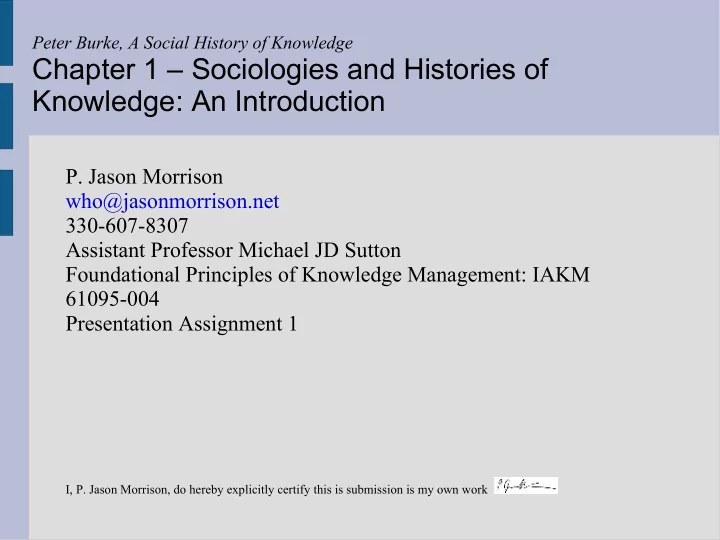

Peter Burke, A Social History of Knowledge Chapter 1 – Sociologies and Histories of Knowledge: An Introduction P. Jason Morrison who@jasonmorrison.net 330-607-8307 Assistant Professor Michael JD Sutton Foundational Principles of Knowledge Management: IAKM 61095-004 Presentation Assignment 1 I, P. Jason Morrison, do hereby explicitly certify this is submission is my own work
Peter Burke, A Social History of Knowledge Chapter 1 – Sociologies and Histories of Knowledge: An Introduction Goals of Text A major aim is to study present 'knowledge society' by taking the perspective of long-term trends A major goal is 'defamiliarization' – while inside a system, it looks like 'common sense.'
Peter Burke, A Social History of Knowledge Chapter 1 – Sociologies and Histories of Knowledge: An Introduction Rise of the Sociology of Knowledge France Writers examined the social origins of basic categories—shared assumptions. General conclusion: social categories are projected on to the natural world. United States Veblen and others became interested in relationship between knowledge and specific social groups and institutions. Germany Following/diverging from Marx, sociologists found ideas to be socially 'situated.' Interests of a group lead to development of ideology.
Peter Burke, A Social History of Knowledge Chapter 1 – Sociologies and Histories of Knowledge: An Introduction What is a Sociology of Knowledge? Not a history of ignorance or study of obstacles to finding truth, but also social explanation of the truth. Organized and systematic study of how what people believe to be truth or knowledge is influenced by their social environment.
Peter Burke, A Social History of Knowledge Chapter 1 – Sociologies and Histories of Knowledge: An Introduction First wave of sociology of knowledge vs. second wave Shift from 'acquisition and transmission of knowledge' to 'construction,' 'production,' or 'manufacture' (postmodernism) More 'knowledge-holders' are considered, more kinds of knowledge taken seriously More concerned with smaller groups – 'microsociology' – 'the anthropology of knowledge' Rather than social class, more attention paid to gender and geography
Peter Burke, A Social History of Knowledge Chapter 1 – Sociologies and Histories of Knowledge: An Introduction The book will use parts of all these different approaches to try to counteract the specialization and fragmentation of the subject
Peter Burke, A Social History of Knowledge Chapter 1 – Sociologies and Histories of Knowledge: An Introduction What is knowledge? Information = raw, Knowledge = cooked Will include things considered knowledge in the past, but not now; Different kinds of knowledge (ars and scientia, etc.) History of concepts is important part Avoid assumption of intellectual progress - On an individual level, depth pushes out breadth of knowl - Same with 'knowledge explosions' like printing, scientific revolution, etc.
Peter Burke, A Social History of Knowledge Chapter 1 – Sociologies and Histories of Knowledge: An Introduction Plurality of knowledges One way to distinguish is by use: Gurvitch (perceptual, social, everyday, technical, political, scientific, philosophical Another is by different social groups, including implicit knowledge. Emphasis of book will be dominant 'academic' knowledge, with real effort made to have a wider framework – interaction of scholars and craftsmen.
Recommend
More recommend